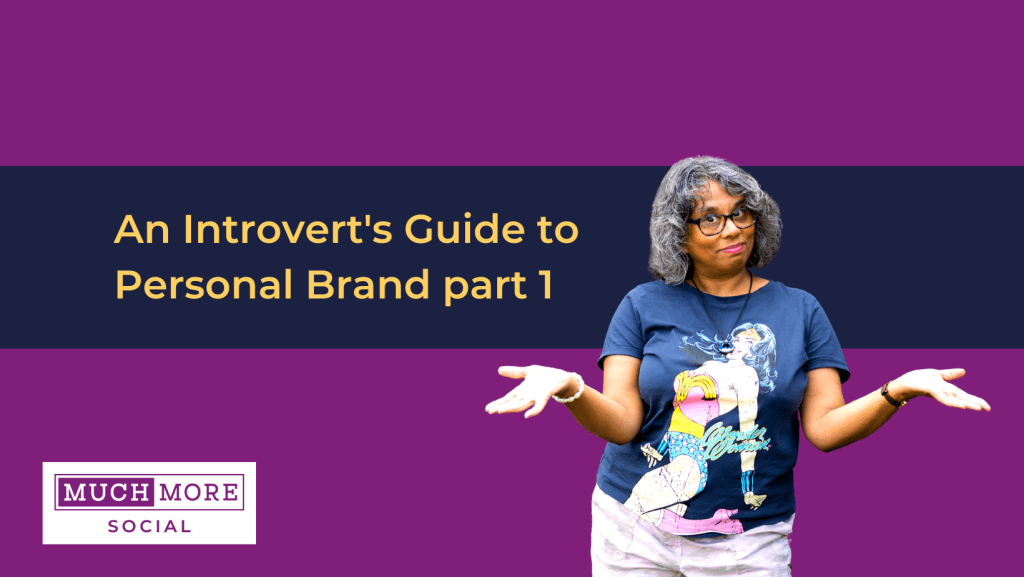
Special thanks to Anita Popat, social media strategist and content creator for introverts, for inviting me as her guest on this Instagram Live.
This is a transcript of the conversation, with a few additional points to help the flow of the written word.
ANITA. In the context of a small business owner, what is personal branding?
ELLA. Personal branding is about putting your personality into the content, and this can be to different degrees.
Personal branding is as much for product business owners, as well as service business owners. I think, especially if you produce and craft items and sell them, there is a tendency to hide behind your products.
Some people are happy just to speak. I’ve seen your brilliant reels, Anita, where you’ve talked about not needing to show your face but let people hear your voice. You can show your hands making something or shoot from a different angle for example the back of your head.
If you want to show your face then do it, because it’s really about making your personal brand connect with people on a personal level. You want to attract people who are going to see you as the go-to person, whether it’s something about the product you’re making or selling, or you’ve got a service to offer.
This is the reason why I say that is personal branding is so effective for letting people know that you exist, that you’ve got a business, that you’re out there, what you do, how you help.
If you don’t share your personal brand, you just become yet another person working in that sector or industry. You have to define yourself more than that.
Your personal brand is helping you to stand out from the crowd and stand out from your competition. In this very competitive world that we’re in now, especially online, you’ve got to do something that helps you to show your audience what you’re about.
ANITA. What’s involved in creating your personal brand? Is it about sharing your personal life?
ELLA. I always say to people to think about what you want to be known for and if people say, ‘I want to be known for making these amazing handmade soaps’ then tell the story behind why it is you started making this product. Explain what sparked your interest.
My story is I changed from being a teacher to social media marketing because my mum passed away. These are stories which are real, and they’re very human, and they’re very relatable.
Tell people some of the stories behind how your business started and what particularly interests you in terms of how you go about making your products.
- Where do you source your ingredients from?
- Where do you source the raw materials from?
- What’s the process like? Then show them the process.
Behind-the-scenes content works very well and show people the process to e.g. ‘This is where I do my making, or this is my office.’

Show your people your environment, ‘A Day in the Life’ content or the fact that you’ve just been to the gym.
No, you don’t need to talk about your personal life. You don’t need to talk about your family, your children, your friends. Think about what and how much you want to share.
I’d say carve out three stories, because from those three stories, you’ll start to find that your creative mind starts to take off a little bit more. You’ll begin to think about other stories and that one idea sparks another.
ANITA. Yes, it’s important to humanise your business with stories. People feel better if they can get to know you, especially as a service-based business, before you work with them.
What would you say to people who believe they don’t have anything interesting to say?
ELLA. We’ve got to be realistic and realise that even the celebrities and people in the public eye all started off with pretty normal, ordinary lives and the things happened to them. That’s why I’m really interested in reading about people’s lives, like Joe Wicks, for example, who was a PT before he became famous.
Don’t undermine yourself, don’t underplay yourself. Don’t underestimate the story. Not everybody wants to hear about how you got this massive deal and made this amount of money, or how you got this great contract.
People are actually very interested in the ordinary. Don’t think that your stories aren’t compelling enough. Your stories are real and relatable.
There is always going to be somebody out there who thinks, “I can relate to that”, “that happened to me”, “that’s something I’m going through now”, “that’s something I’m interested in”, or “I’m looking for that product”, or “I’m looking for this service”.

You’re telling them about it in this approachable way rather than just trying to sell it to them through ads, which is what some people see as the quick fix route.
The quick fix route doesn’t tell you anything about the people behind the product. So I would say don’t underestimate the value of your stories.
ANITA. Okay, so they are thinking “I’ve seen you go through the process, and I’m going to give you my money because I trust you over someone else who’s just using an ad to say the same thing.”
Exactly, this ties in with the people who have been your secret admirers, which I heard you talking about before Anita. I think your secret admirers are going to be those people who have been watching you and paying attention.
They may not have made any interaction at all with your posts, but they’ve seen them. They’ve clocked that you know what you’re about. Then when they’re ready, and it’s not necessarily the fact that people are going to buy from you there and then, but when they’re ready to buy from you, they will remember you. They’ve remembered you because you’ve been real and authentic.
Attract the people you want to work with. ‘Attract the best and repel the rest’ is the saying.
If you show off and are pretending to something you’re not, that’s not really you. You’re more likely to attract the wrong kind of client. Then if you do decide to work with them, because you are thinking “this is brilliant, I’ve got somebody who wants to work with me, or someone who’s going to pay me” you won’t be able to sustain that.
You’ll become exhausted because you can’t meet what they thought you were.
Your personal brand allows people to get to know what you’re like, follow you and know your story. They know the way that you operate, they’ve seen the way that you go about your day, your systems, your processes and everything else.
Then they’re much more likely to be a long-lasting client or customer that will keep coming back to you.
ANITA. Yes, it’s about consistency, it’s easier to sustain being you. Keeping your personal brand consistent really matters.
How do you start mapping out what your personal brand looks like?
ELLA. Get a piece of paper or your notes on your phone, or spreadsheet, and write down all the things that you think are the personality characteristics that relate to you. There are lists online of all these personality words to describe us.
Also come up with your own phrases as well, because you’ll have heard people talk about you. The more important thing with this is to ask your previous customers, your clients, your peers and your associates.
Ask them to answer three questions about you.
Here’s some examples to choose from.
- What would you say is my greatest strength?
- Why did you choose to work with me?
- How would you describe the way I work compared to someone else?
- What makes me different to someone else?
- What was one thing in particular that you liked about my product/my offer?
- What would you say is the thing the makes me, me?
Gather together all these ideas, words and phrases that describe you, your achievements and your successes and everything else.
You can then start to sift out all the ones that are kind of a little bit bland, and boring, and start to focus in on the ones that actually go together. This is what I call a personal brand pillar. Then put other ones together to make another personal brand pillar. Keep going until you have 3 or 4 pillars that sum up how you want to be known.
Just to say, this process of actually working on your personal brand and people getting to know you for what you want to be known for is a long journey. It’s evolving because it involves you, and we don’t ever stay the same as human beings, do we?
You want to think about what makes you unique and individual because that’s what makes you different to the next person.
This is why I got into personal branding because there were so many social media marketers out there, and I thought I’ve got to find a way to stand out.
Once you’ve got your personal brand pillars, it will give you the foundations for everything else you’re going to do in relation to your personal brand, from the networking, the content creation, the blog posts, the Instagram lives, events. It will be the foundation for everything.
This will help you to consistently show up as you because that is what builds trust.
A quick round up
This is the first part of a longer interview I did with Anita. Look out for part 2 in the next blog post.
Hopefully this has provoked some thoughts about personal branding if you consider yourself an introvert. Becoming known for your work isn’t exclusively for extroverts. It’s equally as important for introverts, if not even more so, as you can use your personal brand to shine a spotlight on your business.
Are you looking to work on your personal brand? I’d like to help you. Drop me a message here.
Category: Personal Branding, Social Media Tips